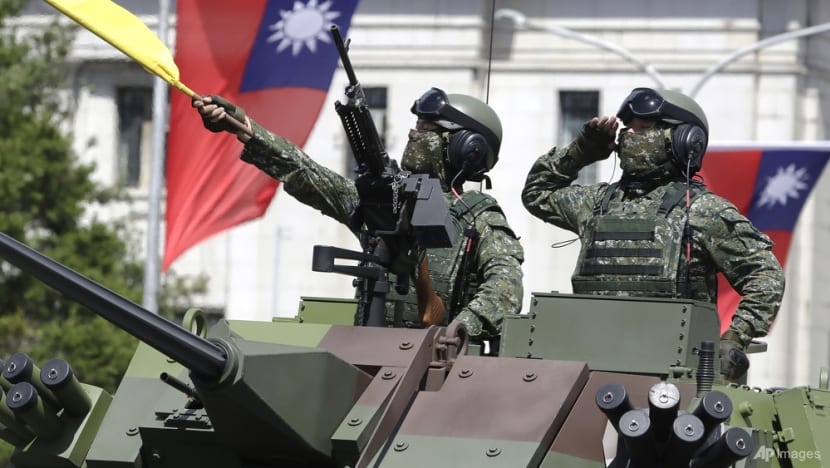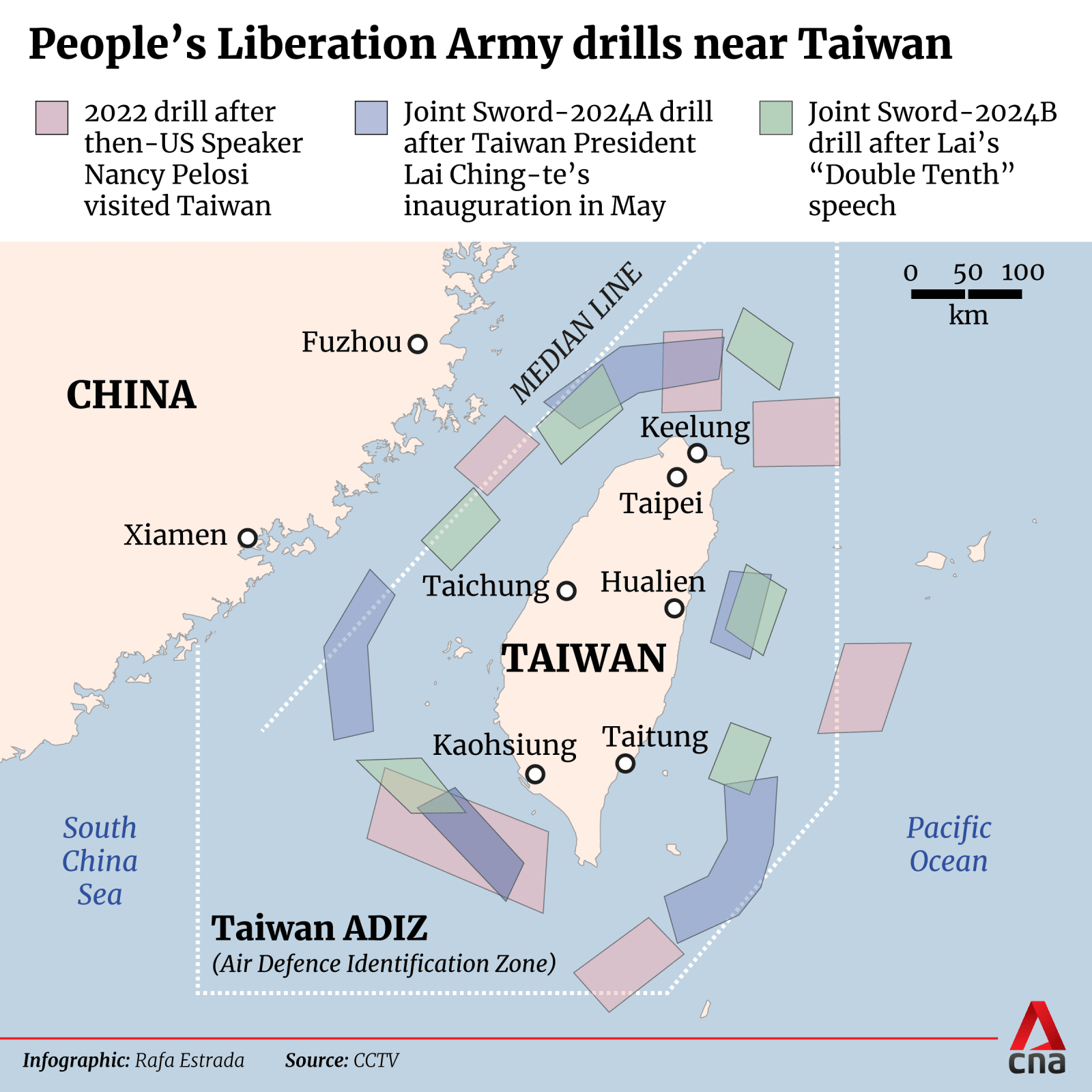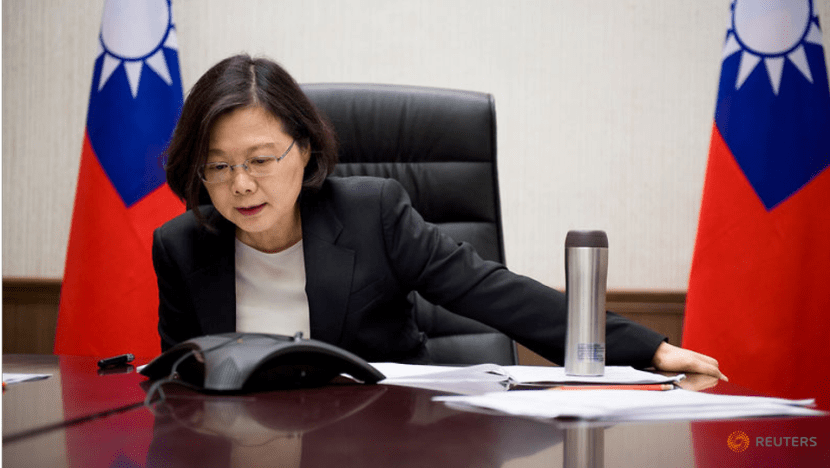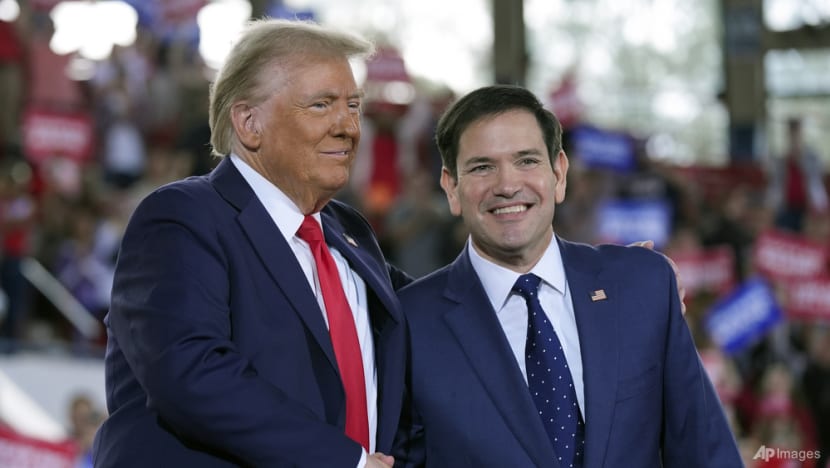analysis East Asia
Trump card or wild card? What Trump 2.0 could spell for Taiwan, China and regional stability
Will Taiwan become a bargaining chip in the US-China rivalry under US President-elect Donald Trump’s transactional diplomacy, and how might Beijing respond?


This audio is generated by an AI tool.
SINGAPORE: US President-elect Donald Trump’s second presidency - with his hawkish cabinet picks - could change the dynamics of US-Taiwan relations, as well as the calculations behind China’s strategy towards the self-ruled island, say analysts.
This comes as Beijing evolves its military strategy to blockade Taiwan, a tactic that observers believe is designed to intensify pressure on the island and sway public sentiment from within.
With China hardliners set to hold key roles in Trump 2.0, they are likely to lock heads with Beijing on numerous fronts, potentially keeping China preoccupied and easing Chinese pressure on Taiwan, observers note.
However, a deterioration of US-China ties also raises risks of miscalculation that could escalate tensions in the Taiwan Strait and threaten broader stability, they add.
On the other hand, Mr Trump’s brand of transactional diplomacy and “America First” stance, including demanding Taiwan pay for US protection, raises questions about the reliability of US support for the island.
“While it remains unclear exactly what policies Trump and his administration will adopt regarding the Taiwan issue, his strongman image and the hawkish stance of key cabinet appointees on China could provoke a strong response from Beijing in its long-standing claims over Taiwan,” Dr Wu Se-chih, director of Taiwan Thinktank's China Research Center, told CNA.
FANNING PRESSURE FROM ALL CORNERS
Taiwan has been facing growing pressure from Beijing in recent years. On the economic front, China has reinstated tariffs on 134 items it imports from the self-ruled island and is studying further trade measures.
But it’s Beijing’s military press that has captured global attention. Air and naval sorties around Taiwan have become a near-daily occurrence, with many crossing the median line that once served as an unofficial border between the two sides.
Major war games staged just last month saw Chinese forces effectively encircling the island, similar to a previous exercise in May. Named “Joint Sword-2024B”, Beijing described the drills as a warning against “separatist acts”.
They were carried out three days after Taiwanese President William Lai’s “Double Ten” speech on Oct 10 to mark the founding of Taiwan. During his remarks, he declared that Taiwan and China “are not subordinate to each other” and China had no right to represent the island.

According to Dr Wu, China’s major military exercises towards Taiwan in the past two to three years have centred on a blockade scenario, departing from past drills that simulated aggressive attacks aimed at an eventual invasion.
Such drills have been inching closer to the island. The ones in May and October saw nearly all military assets positioned significantly beyond the median line towards Taiwan, according to deployment maps shown by Chinese state news agency CCTV.
He views this shift as part of China’s ongoing efforts to influence public sentiment in Taiwan, particularly among those who support eventual unification with the mainland or those who remain undecided.
“For example, pro-unification or anti-independence politicians in Taiwan may leverage the proximity of these drills to heighten fears of a potential conflict, potentially swaying public sentiment in their favour,” Dr Wu said.
“The new Trump administration is likely well aware of this perspective.”
He explained that such drills are intended to demonstrate China’s ability to blockade Taiwan’s trade routes, effectively crippling the island’s economy and disrupting its society.
A blockade would also have global ramifications by potentially crippling supply chains for advanced technologies such as semiconductors, considering Taiwan’s production prowess in this domain. Taiwan produces approximately 70 per cent of the world’s semiconductors and over 90 per cent of the highest-end models.
A blockade is an “intermediate possibility” for how China might try to use “coercive leverage” to manoeuvre Taiwan towards unification, said Professor Scott Kastner from the University of Maryland’s Department of Government and Politics.
“Many people are more worried about (such) a scenario than an actual invasion, because it would, in some sense, be more doable from the Chinese perspective,” he highlighted during a guest lecture in Singapore in September.
At the same time, Prof Kastner cautioned that a blockade also entails significant risks for Beijing because a prolonged standoff could compel intervention from external parties, including the US.
“Historically, it's very hard to get another state to capitulate using a blockade alone. They generally don't work like that … (and) if there's an effort by the US to try to break the blockade, the situation can escalate very quickly,” he explained.
ASSESSING POTENTIAL AMERICAN ACTION
The rub is how the US will approach the issue of Taiwan under a second Trump presidency.
Washington has long followed a policy of strategic ambiguity, being intentionally vague about how it would support Taiwan should China attempt a takeover. While observers say Mr Trump has not indicated he intends to change the status quo, they caution that the devil is in the details.
During his first term, Mr Trump was a vocal supporter of Taiwan. In December 2016, soon after winning the US presidential election, he made headlines by accepting a congratulatory call from then-Taiwanese President Tsai Ing-Wen.
This marked the first time an American president-elect spoke directly with a Taiwanese leader since 1979. At the time, Mr Trump described the discussion as revolving around the “close economic, political, and security ties” between Taiwan and the US.

Public data reveals that under Trump 1.0, the US approved US$21 billion in arms sales to Taiwan across 11 packages, compared to US$7 billion under the Biden administration.
However, rhetoric during the US presidential hustings suggests a shift in Mr Trump’s tone. In a late October interview, Mr Trump accused Taiwan of "stealing America's chip industry" and threatened to impose tariffs on Taiwanese semiconductor exports.
The businessman-turned-politician has also demanded that Taipei pay for US protection, and called for the island to increase its defence spending to at least 10 per cent of its gross domestic product, up from the current three to five per cent.
Mr Trump’s remarks have raised concerns about the durability of Washington’s support for Taiwan as China looms ever larger, and the implications for regional stability in the years ahead.
“Trump has long taken a more transactional approach to security cooperation, prioritising trade and economic strengthening over security,” said Dr Wu from Taiwan Thinktank.
“Such a stance is undoubtedly causing anxiety within Taiwan, especially as China has intensified pressure on the island to an unprecedented scale in the past one to two years.”
Dr Chang Ching, a research fellow at the Taipei-based Society for Strategic Studies, highlighted growing concerns that Taiwan may be leveraged as a "bargaining chip" by the US in its negotiations with Beijing on broader geopolitical and economic issues.
Dr Chang said such speculation has raised fears that Taiwan could be effectively “sacrificed” in exchange for concessions on other strategic matters. But he isn’t convinced.
"Some people fail to understand that the US does not have ownership of Taiwan and therefore cannot 'give Taiwan away' to Beijing in exchange for concessions," he told CNA.
ALL EYES ON TRUMP’S CABINET PICKS
Against this backdrop, observers say Mr Trump’s team picks have drawn significant attention in Taiwan due to the considerable sway the appointees have in determining administration policy.
“More so for the US than most governments, personnel is policy,” Mr Steven Okun, senior advisor from the public affairs consultancy firm APAC Advisors, previously told CNA.
Taipei is likely reassured to some degree by the appointment of Mr Marco Rubio as US secretary of state and Mr Mike Waltz as national security advisor, given their history of pro-Taiwan statements, Associate Professor Chong Ja Ian from the Department of Political Science at the National University of Singapore (NUS) told CNA.
In 2019, after Mr Xi made a fresh call for Taiwan to embrace “peaceful reunification” with China and reject independence, Mr Rubio reaffirmed his support for the island in a tweet, describing it as “an independent democracy and strong ally of the United States”. He further emphasised that the US should strengthen ties with Taiwan “in the face of China's increasingly aggressive actions and rhetoric”.
Mr Rubio has also introduced several pieces of legislation aimed at boosting American support for Taiwan.
One such legislation aims to strengthen US-Taiwan ties by elevating the US representative to Taiwan to a Senate-confirmed position, akin to how an ambassador to a foreign country or international organisation must be confirmed by the senate.
Another, the Taiwan Peace Through Strength Act, focuses on expediting US arms sales to Taipei, increasing joint military training and establishing a munitions acquisition fund.
Alongside Mr Rubio and Mr Waltz, the emerging Trump 2.0 administration also includes military veteran and news commentator Pete Hegseth as the nominee for defence secretary.
Observers have pointed out that all three men are outspoken critics of China. They are known for highlighting alleged and perceived threats posed by Beijing across various domains, and advocating for tough countermeasures.
Dr Wu expects Mr Rubio as secretary of state to advocate for tough measures to challenge Beijing on the international stage, across multiple fronts like trade, tech and security. The international affairs observer suggests this could preoccupy China, potentially resulting in a less immediate focus on exerting pressure on Taiwan.
Assoc Prof Chong concurs that having China hawks in key diplomatic and security roles within Mr Trump's cabinet may benefit Taiwan. However, he also noted the high turnover of key officials during Mr Trump’s time in the Oval Office.
“(Trump) has a tendency to cycle through his key personnel quickly, particularly when their loyalty is called into question. So, the question of how long Mr Rubio will remain in office is uncertain,” said Assoc Prof Chong, who is also a non-resident scholar at Carnegie China.

RAISING THE REGIONAL TEMPERATURE
Regardless, analysts anticipate that Mr Trump’s assembling of a foreign policy and national security team dominated by China hawks signals an inevitable deterioration in US-China relations.
They warn that this raises the risks of conflict, even as both sides are likely to make calculated moves to avoid unnecessary escalation.
Dr Wu from Taiwan Thinktank noted that Mr Trump has signalled his intention to shift resources away from Europe, including reducing military deployments and support, in favour of strengthening America’s presence in the Indo-Pacific - a region that was prioritised during Mr Trump’s first term.
"Such a move would undoubtedly escalate tensions in East Asia and the South China Sea, both of which are fraught with potential flashpoints," Dr Wu said. He pointed out that while an increased US military presence in the region could enhance Taiwan’s security, it also raises the risk of accidents or miscalculations.
Mr Trump has warned China against using military force to achieve reunification with Taiwan.
“Given his strongman image, his administration may believe that China would hesitate to challenge his stance on the issue. However, they could be mistaken, and the consequences of such a miscalculation could be significant,” Dr Wu cautioned.
Should China decide to blockade Taiwan, a tough response by the US under Mr Trump might get Beijing to be more cautious or restrained, Assoc Prof Chong said. But he warned that it could also yield the opposite effect.
China has repeatedly underscored it will not tolerate any internal or external attempts towards Taiwan independence. Chinese President Xi Jinping has framed it as the first red line that must not be crossed in bilateral ties - a refrain that he echoed recently at the APEC summit in Peru.
According to a Nov 20 commentary by University of Venice analyst Juan Alberto Ruiz Casado on The Diplomat site, Beijing’s leadership is convinced that a new Trump administration will swiftly ramp up preparations, which will in turn influence their strategic calculations and responses toward Taiwan.
“If the Trump administration decides to clearly break with the ‘status quo’ that has maintained peace in the Taiwan Strait for decades, the Chinese Communist Party is unlikely to back down or simply yield,” he added.
As regional uncertainty looms, analysts say what’s certain is that Taiwan should focus on strengthening itself rather than relying on support from external parties like the US.
Washington does not have official relations with Taiwan, but is legally obligated to provide the island with the means to defend itself, including through the sale of weapons and military assets.
According to reports from the Financial Times earlier this month, Taiwan has contacted the incoming US administration with a proposal to acquire US$15 billion worth of weaponry, including an Aegis destroyer.
The article suggested that F-35 fighter jets could also be requested - although analysts have said the likelihood of Washington supplying them is slim, due to concerns over riling Beijing as well as fears such military technology could fall into Chinese hands.
“The real issue is whether Taiwan is willing to rely entirely on the US for its security, or whether it should focus on strengthening its own military capabilities to safeguard its sovereignty,” said Dr Chang from the Society for Strategic Studies.
“I believe the answer is clear.”


















